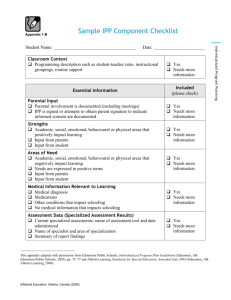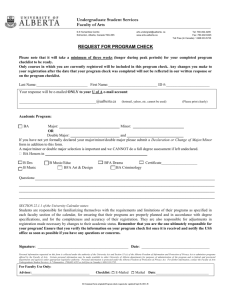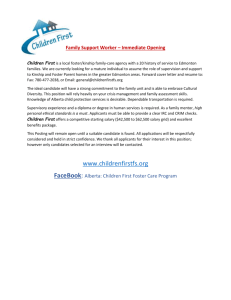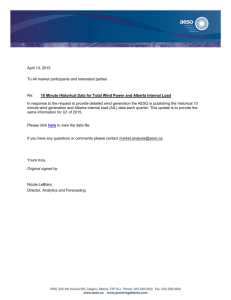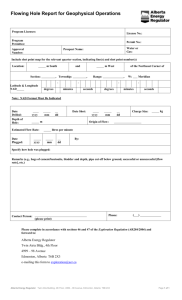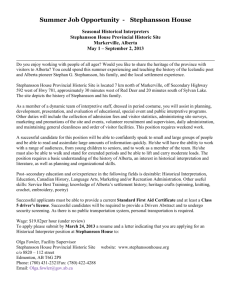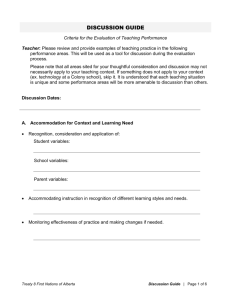Essential Information Checklist
advertisement
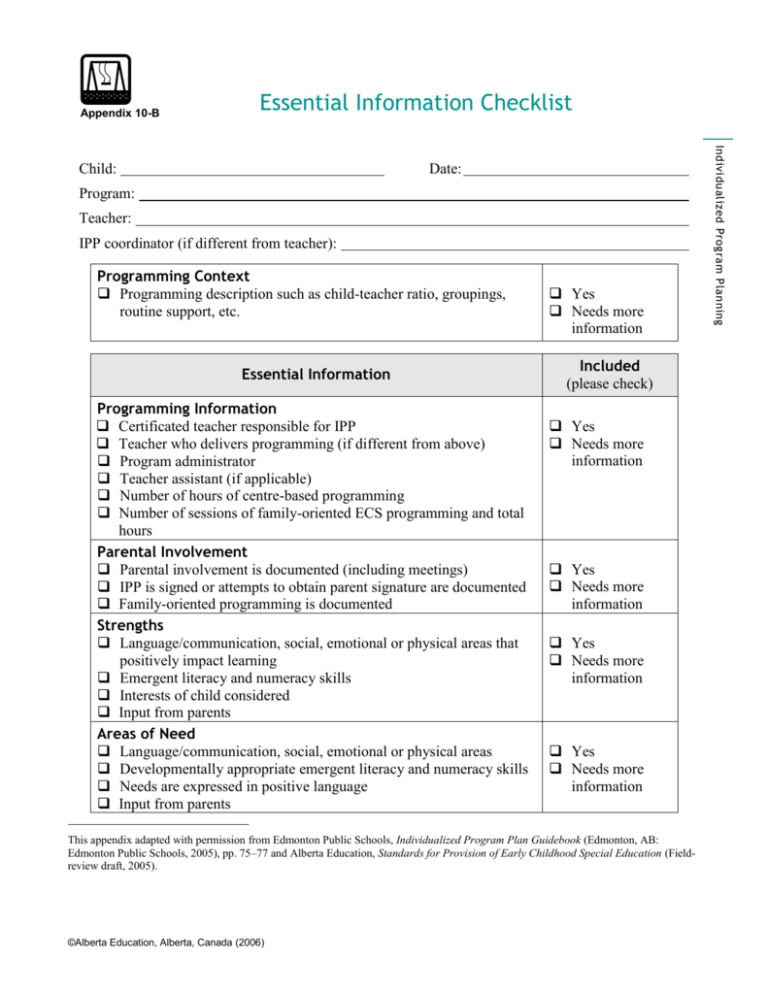
Appendix 10-B Essential Information Checklist Date: Program: Teacher: IPP coordinator (if different from teacher): Programming Context Programming description such as child-teacher ratio, groupings, routine support, etc. Essential Information Programming Information Certificated teacher responsible for IPP Teacher who delivers programming (if different from above) Program administrator Teacher assistant (if applicable) Number of hours of centre-based programming Number of sessions of family-oriented ECS programming and total hours Parental Involvement Parental involvement is documented (including meetings) IPP is signed or attempts to obtain parent signature are documented Family-oriented programming is documented Strengths Language/communication, social, emotional or physical areas that positively impact learning Emergent literacy and numeracy skills Interests of child considered Input from parents Areas of Need Language/communication, social, emotional or physical areas Developmentally appropriate emergent literacy and numeracy skills Needs are expressed in positive language Input from parents Yes Needs more information Included (please check) Yes Needs more information Yes Needs more information Yes Needs more information Yes Needs more information This appendix adapted with permission from Edmonton Public Schools, Individualized Program Plan Guidebook (Edmonton, AB: Edmonton Public Schools, 2005), pp. 75–77 and Alberta Education, Standards for Provision of Early Childhood Special Education (Fieldreview draft, 2005). ©Alberta Education, Alberta, Canada (2006) Individualized Program Planning Child: Appendix 10-B Essential Information Checklist (continued) page 2/3 Individualized Program Planning Included (please check) Essential Information Medical Information Relevant to Learning Medical diagnosis Medical information that impacts learning Medications Not applicable or no medical information that impacts learning Yes Needs more information Specialist Assessments Current specialist assessments: names of assessment tools, types of observations and date administered Name of specialist and area of specialization Summary of report findings Yes Needs more information Program-based Assessments and Evaluation of Progress Current pre- and post-classroom assessments: name of tool or type of observation and date administered Summary of findings Child’s current level of functioning Assessment procedures for monitoring and evaluating child progress on IPP goals are identified (e.g., observations, work samples, diagnostic or standardized tests, developmental assessments, checklists) Coordinated Support Services (Additional staff, agencies, specialists and services) Type and format of support services offered within the program setting Type and format of support services offered outside the program setting Amount of time services offered (level of support) Instructional Accommodations Individualized instructional accommodations and strategies (e.g., unique expectations, specialized materials, resources, facilities, equipment, assistive technology, personnel) Aligned with child’s personal strengths, areas for growth and goal statements Yes Needs more information Yes Needs more information Yes Needs more information ©Alberta Education, Alberta, Canada (2006) Appendix 10-B Essential Information Checklist (continued) page 3/3 Measurable and Meaningful Goals and Objectives Consistent with the child’s area of growth and clearly linked to assessment data Meaningful to child and his or her family Consistent with child’s level of development Reflects an actual skill or behaviour that the child needs in order to participate and actively engage in current or future learning Short-term objectives are measurable and/or observable Expected behaviour is described Conditions under which the child will perform the task Criteria for measurement Date that objective is expected to be achieved Based on input from teachers and parents Manageable number of goals and objectives New objectives are added or revised as current objectives are reviewed and/or achieved Language is positive and family-friendly Planning for Transition Begins in September and is ongoing Describes child’s transition needs across environments A summary of planned actions to prepare child for success in upcoming changes to environment is outlined Transition plan involves family Transition plan involves other specialists where appropriate Year-end Summary Year-end summary includes most effective strategies, areas of continuing concern and recommendations for next year ©Alberta Education, Alberta, Canada (2006) Included (please check) Yes Needs more information Yes Needs more information Yes Needs more information Individualized Program Planning Essential Information
